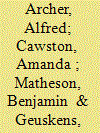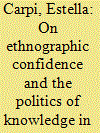|
|
|
Sort Order |
|
|
|
Items / Page
|
|
|
|
|
|
|
| Srl | Item |
| 1 |
ID:
171348


|
|
|
|
|
| Summary/Abstract |
What, if anything, is problematic about the involvement of celebrities in democratic politics? While a number of theorists have criticized celebrity involvement in politics, none so far have examined this issue using the tools of social epistemology, the study of the effects of social interactions, practices, and institutions on knowledge and belief acquisition. We will draw on these resources to investigate the issue of celebrity involvement in politics, specifically as this involvement relates to democratic theory and its implications for democratic practice. We will argue that an important and underexplored form of power, which we will call epistemic power, can explain one important way in which celebrity involvement in politics is problematic. This is because unchecked uses and unwarranted allocations of epistemic power, which celebrities tend to enjoy, threaten the legitimacy of existing democracies and raise important questions regarding core commitments of deliberative, epistemic, and plebiscitary models of democratic theory. We will finish by suggesting directions that democratic theorists could pursue when attempting to address some of these problems.
|
|
|
|
|
|
|
|
|
|
|
|
|
|
|
|
| 2 |
ID:
175146


|
|
|
|
|
| Summary/Abstract |
Fieldworkers in politically sensitive spaces traditionally need to negotiate their presence in the field with local (in)formal authorities and epistemic power-holders. I illustrate how attempts at both holistic politicisation and neutralisation of the research space can question ethnographic knowledge production. Drawing upon the anthropology of silence and agnotology, I interrogate the whats and hows of ethnographic authority and local validation of ethnographic research when political and epistemic powers complexly and discontinuously overlap. By examining how knowledge is boasted about, concealed or questioned by political and humanitarian actors, I examine the ways in which a lack of political protection, as well as overt advocacy, shape different modalities of access – or lack of access – to the field. Against the backdrop of a growing body of literature on the ethics of research in settings affected by political transformations and emergency crises (such as today’s Arab Levant), I try to upend ethnographic confidence as a self-centred process of knowledge production. I instead rethink it not only as an ethical but also an inter-subjective effort towards a more effective integration of the counter-epistemologies of field interlocutors into our own research.
|
|
|
|
|
|
|
|
|
|
|
|
|
|
|
|
|
|
|
|
|